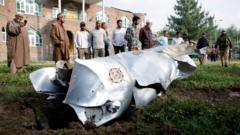**North Korea and Russia commemorate the groundbreaking of a significant road bridge across the Tumen River, symbolizing deeper ties amid military support in the Russia-Ukraine War.**
**North Korea and Russia Strengthen Bilateral Relations with Major Bridge Project**

**North Korea and Russia Strengthen Bilateral Relations with Major Bridge Project**
**The first road bridge will link North Korea and Russia, enhancing military and economic cooperation amid ongoing conflict in Ukraine.**
North Korea and Russia are embarking on a significant infrastructure project that will see the construction of their first road bridge spanning the Tumen River, which serves as a natural border between the two nations. This initiative, announced Thursday, underscores the strengthening of bilateral relations, particularly following North Korea's commitment to support Russia in the ongoing conflict with Ukraine.
The groundbreaking ceremony took place simultaneously on either side of the border on Wednesday. Premier Mikhail Mishustin of Russia described the bridge as a crucial step forward for Russian-Korean relations. In a video conference, North Korean Prime Minister Pak Thae-song described the structure as a "historic monument," commemorating the partnership efforts of leaders Kim Jong-un and Vladimir Putin.
The new two-lane bridge, measuring slightly over half a mile in length, is set to take 18 months to complete. According to North Korean state media, its completion will facilitate increased passenger traffic, commercial exchange, and tourism between the two countries. The new bridge signifies an important enhancement of the existing cross-border train link.
Following a period of strained relations in the post-Cold War era, North Korea and Russia began to revitalize their ties in 2023. This came after North Korea began supplying Russia with arms and artillery to support its military efforts in Ukraine. A treaty establishing a comprehensive strategic partnership was agreed upon during President Putin's visit to Pyongyang last June, promoting mutual defense and cooperation.
Additionally, North Korea has begun deploying troops to assist Russian forces in their conflict, confirming the presence of 15,000 North Korean soldiers on Russian soil, with reports suggesting significant casualty numbers. In return, Russia has reportedly provided air defense systems, drones, and other advanced military technology to North Korea, further intertwining their military capabilities.
Meanwhile, North Korea recently revealed the launch of its latest naval ship, which analysts suggest may have been developed with support and technology from Russia. This growing collaboration between the two nations not only reflects their shared military interests but potentially signals a new geopolitical alignment in the region, as both countries seek to counterbalance Western influence in world affairs.
The groundbreaking ceremony took place simultaneously on either side of the border on Wednesday. Premier Mikhail Mishustin of Russia described the bridge as a crucial step forward for Russian-Korean relations. In a video conference, North Korean Prime Minister Pak Thae-song described the structure as a "historic monument," commemorating the partnership efforts of leaders Kim Jong-un and Vladimir Putin.
The new two-lane bridge, measuring slightly over half a mile in length, is set to take 18 months to complete. According to North Korean state media, its completion will facilitate increased passenger traffic, commercial exchange, and tourism between the two countries. The new bridge signifies an important enhancement of the existing cross-border train link.
Following a period of strained relations in the post-Cold War era, North Korea and Russia began to revitalize their ties in 2023. This came after North Korea began supplying Russia with arms and artillery to support its military efforts in Ukraine. A treaty establishing a comprehensive strategic partnership was agreed upon during President Putin's visit to Pyongyang last June, promoting mutual defense and cooperation.
Additionally, North Korea has begun deploying troops to assist Russian forces in their conflict, confirming the presence of 15,000 North Korean soldiers on Russian soil, with reports suggesting significant casualty numbers. In return, Russia has reportedly provided air defense systems, drones, and other advanced military technology to North Korea, further intertwining their military capabilities.
Meanwhile, North Korea recently revealed the launch of its latest naval ship, which analysts suggest may have been developed with support and technology from Russia. This growing collaboration between the two nations not only reflects their shared military interests but potentially signals a new geopolitical alignment in the region, as both countries seek to counterbalance Western influence in world affairs.





















